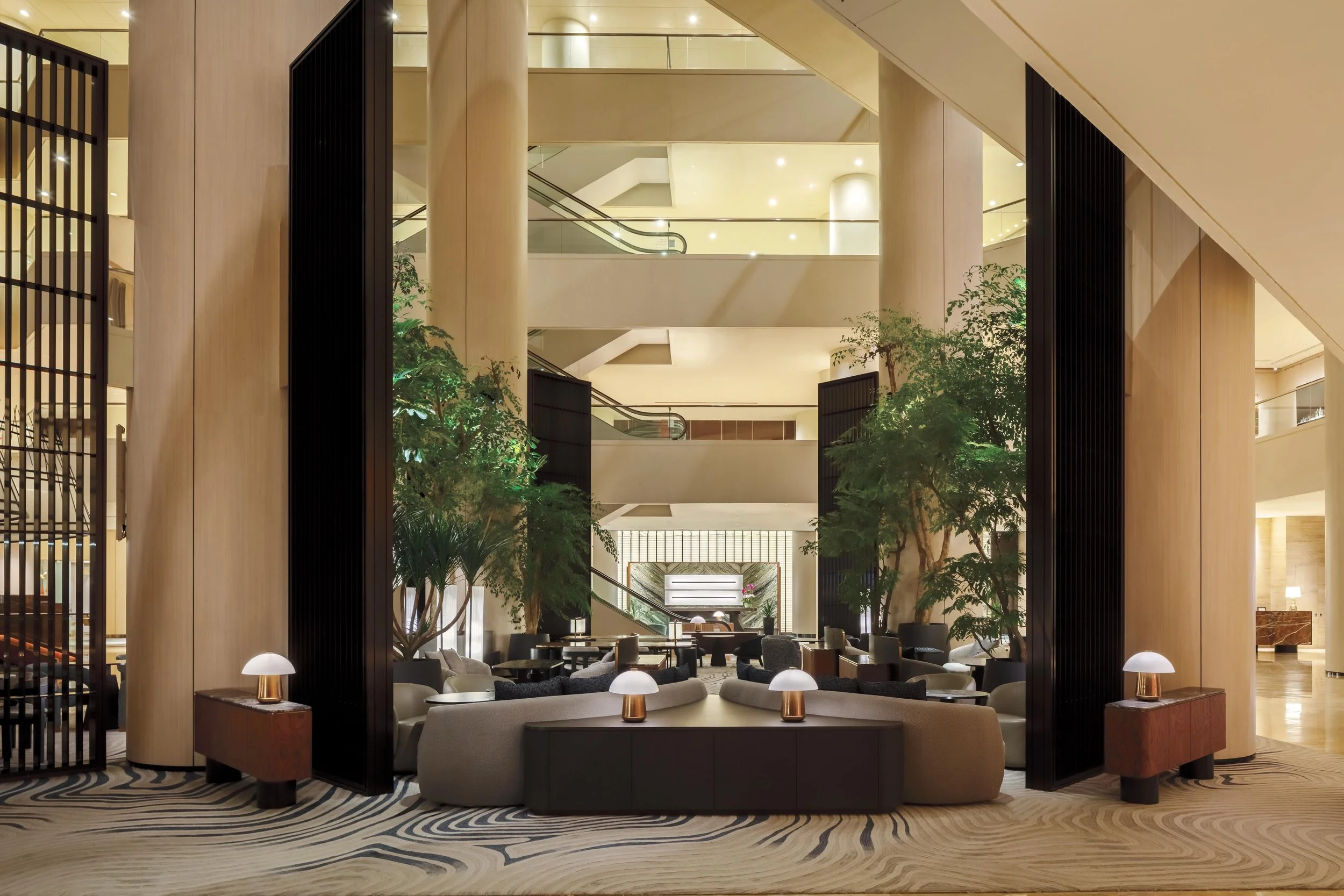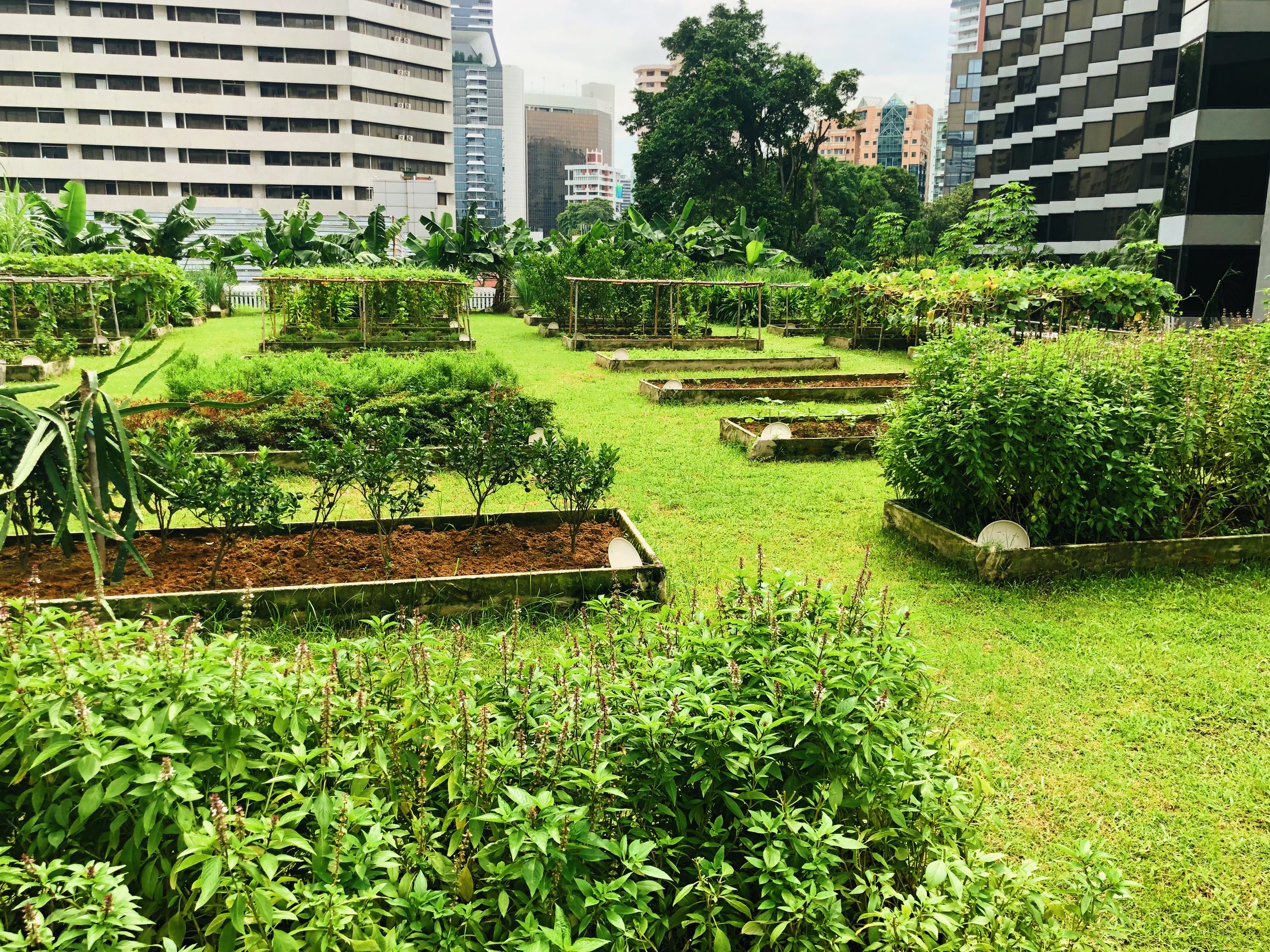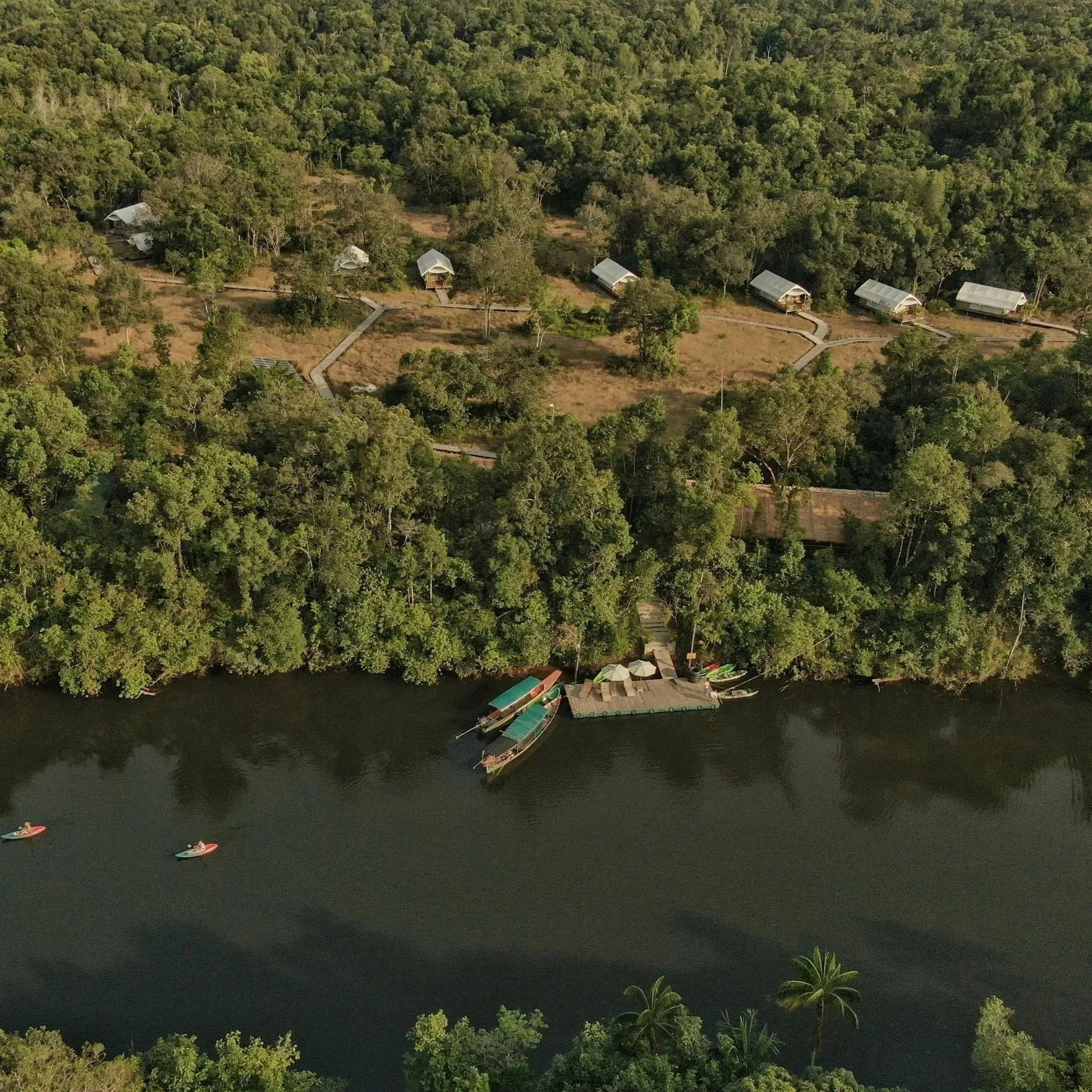How These Hotels Turn Urban Sustainability Challenges Into Scalable Impact
Photo by Kimpton Maa-Lai Bangkok
Across cities in Asia where land is scarce, energy costs are high, and infrastructure is often stretched, hotel developers find themselves at the intersection of rising expectations and urban realities.
Sustainability has become both a brand imperative and a regulatory compliance.
Guests want to see visible and verifiable sustainability efforts. Governments are introducing stricter regulations. But delivering on those promises amid the constraints of dense urban environments may also be the hardest.
From Bangkok to Singapore, designing and operating a sustainable hotel in a city means contending with limited footprints, ever-shifting policies, and relentless pressure on space and resources. Achieving meaningful impact in these compact city centers requires more than good intentions. It demands innovation, discipline, and long-term thinking.
And yet, it is precisely in these high-pressure environments that innovation flourishes.
As population centers and global travel gateways, cities offer hospitality brands not only their toughest test but their clearest opportunity to lead.
In this article, we spotlight three hotels, Pan Pacific Singapore, Grand Hyatt Singapore, and Kimpton Maa-Lai Bangkok that have risen to the challenge. Rather than seeing constraints as deal-breakers, they’ve turned them into design prompts and operational innovations.
Their stories offer valuable lessons in how to embed sustainability into the urban guest experience, not as an add-on, but as a defining feature.
Pan Pacific Singapore Sets the Bar for Smart, Scalable, and Inclusive Sustainability
At the first glance, Pan Pacific Singapore may not immediately register as an “eco-hotel.” Built in 1986, the hotel proves that aging infrastructure is no barrier to modern sustainability. As a flagship of Pan Pacific Hotels Group, it anchors the group’s identity, operational excellence, and commitment to values-led sustainability.




Operational Intelligence Meets Quiet Ambition
One would imagine that it would require a complete architectural overhaul for a 40-year-old building to meet today’s sustainability goals. Instead, Pan Pacific Singapore took a smart approach by optimizing what it already had through intelligent, well-calibrated upgrades.
For example, photo sensors maximize the use of daylight in lobbies, while energy management systems automatically power down rooms when guests are away.
Between 2023 and 2024 alone, these calibrated interventions helped the hotel cut energy use per guest night by 23%. Solar panels now contribute over 46,000 kWh annually, enough to power dozens of urban households. The hotel’s cooling system is integrated into the broader Marina Square district’s, which provides chilled water for consumption across multiple buildings in the area. This allows the hotel to prevent additional resources, maintenance, energy, and water consumption.
As General Manager Melvin Lim told AST, all of these efforts are aligned with Singapore’s Net Zero 2050 ambition and the hotel’s role in helping to realize it.
Systems Thinking Accelerates Waste Reduction
The hotel’s waste strategy reflects a high level of operational integration.
From filtered water taps in guest rooms to EcoBurner chafing systems in banquet spaces, the logic is to cut waste at the source across departments. According to the hotel, the EcoBurner chafing systems saved over 76,000 liters of water, prevented 1.5 tonnes of landfill waste, and five tonnes of carbon emissions in 2024.
The Lumitics food waste tracker is especially noteworthy as it feeds real-time data back to the kitchen, enabling chefs to adjust straight away, not just in annual reports. A food digester converts kitchen scraps into compost. In 2024 alone, the hotel processed more than 38,000kg of food waste into usable organic matter.
Each of the hotel’s 790 guest rooms is equipped with reusable soap dispensers, eliminating up to 1,000 miniature plastic amenities per day. Waste separation is thoughtfully managed by housekeeping staff, ensuring that recycling doesn’t fall on the shoulders of guests but is operationalized internally.
From left: Solar Panels on Rooftop, EcoBurner at Edge (restaurant). Photos by Pan Pacific Singapore
Kindness Multiplies Impact
But tech isn’t what defines Pan Pacific Singapore’s sustainability ethos. People do.
As Lim shared, every new hire undergoes sustainability orientation as part of onboarding. It’s about building a collective mindset from the get-go. And this collective mindset then fuels proactiveness and a strong sense of purpose among staff.
Through inclusive programming like partnerships with Dementia Singapore and youth culinary education through ComLink+, the hotel is modeling how care-driven hospitality can make tangible impact. This compassionate approach fuels its support for local groups such as the Children’s Cancer Foundation, Fei Yue Community Services, and Club Rainbow, consistently engaging both guests and staff in giving back.
From left: Dementia Singapore MOU Signing Ceremony and Themed Party in Partnership with Community Chest for Children's Cancer Foundation. Photos by Pan Pacific Singapore.
Grand Hyatt Singapore Bets Big on Net-Zero Future
Unlike Pan Pacific’s retrofitting model, Grand Hyatt Singapore is undertaking a full-scale property transformation. The hotel, one of the country’s hospitality flagships, is responding to both its physical aging and the shifting demands of climate accountability by rebuilding with intention.



Wellness Pool. Photos by Grand Hyatt Singapore
Phased Transformation: From Early Movers to Future Leaders
Grand Hyatt Singapore’s sustainability journey began over two decades ago. As early as 2002, the hotel adopted green energy management systems, followed by the installation of a gas-powered Tri-generation plant in 2011. Its sustainability journey follows a four-phase roadmap.
Phase 1 (2002–2015): Energy management and Tri-generation plant
Phase 2 (2023 - 2025): A full property overhaul, switching to 100% renewable energy, adding rooftop gardens, in-house bottling, food waste digesters, and widespread digitization.
Phase 3: Operational optimization and behavioral interventions
Phase 4: Certification pathways toward “Zero Energy” and “Zero Carbon”
This phased model allows the hotel to avoid the common pitfall of isolated “green” projects that can’t scale or sustain impact. It also creates institutional memory, which is a key differentiator in long-term climate strategy.
Photos by Grand Hyatt Singapore
A Forward-Thinking Hotel Runs On 100% Renewable Energy
According to the hotel, it is now powered by 100% renewable energy. The partnership with Flo Energy and the use of traceable Renewable Energy Certificates (RECs) mark a quantitative shift in how hotels approach clean energy. This is about ensuring that every kilowatt-hour used is matched with verifiable, renewable input, directly positioning the hotel as a pioneer in the city-state’s hospitality sector to support Singapore’s Green Plan 2030.
Human Capital Powers Innovation
Grand Hyatt’s commitment to decentralized innovation, where “everyone is a researcher,” empowers each team to iterate and propose new solutions. Director of Engineering Clyric Ng emphasized at the “A Grand Future Starts Here” media briefing that this people-powered engagement model allows the hotel to respond quickly to new insights, whether it’s in waste, water, or wellness.
Back-of-the-house tour at the “A Grand Future Starts Here” media briefing in July 2025. Photos by Grand Hyatt Singapore
Kimpton Maa-Lai Bangkok Invites the City In with Its Generous Hospitality
Located next to leafy Lumphini Park on Langsuan Road, consistently ranked among Thailand’s best hotels, Kimpton Maa-Lai Bangkok dedicates more than 40% of its 8,503 m² of prime real estate to publicly accessible green space.
In Bangkok, where the average green area per person is among the lowest in Asia, this move is highly generous.
Photos by Kimpton Maa-Lai Bangkok.
Civic-Minded Hospitality Enhances Collective Wellbeing
Unlike many luxury properties that wall off their gardens, Kimpton opens them.
This act of generosity transforms hotel space into shared public space, forming the connective tissue between the hotel and its surrounding community.
Pets, families, and everyday Bangkokians walk, pause, and breathe here. Kimpton invites the city in and redefines luxury hospitality as a contribution to community wellbeing and inclusivity.
Photos by Kimpton Maa-Lai Bangkok
Inclusivity Makes A Stronger Brand
Through partnerships with STEPS, Kimpton integrates neurodiverse talent into its service teams and culinary events like “Inclusivi-tea”. Inclusion is built into hiring, training, and even guest experience. Over 70% of IHG properties in Thailand now follow this model, showing the network effects of purposeful hiring.
Photos by Kimpton Maa-Lai Bangkok.
Practicality Wins The Day
The hotel’s operational sustainability is equally thoughtful:
Waste sorting is conducted in partnership with Wake-Up Waste, with proceeds reinvested into team meal subsidies.
An in-house composting system converts 300 kg of food waste monthly into fertilizer, shared with local greening projects.
The hotel is certified LEED Silver featuring triple-glazed windows, non-toxic cleaning agents, and curated Thai-crafted furnishings.
Photos by Kimpton Maa-Lai Bangkok.
Are Asia’s Cities the Next Sustainable Hospitality Frontier?
If Asia’s islands and upcountry resorts have led the region’s sustainable travel discourse, its urban hotels are now stepping up, redefining what’s possible under real constraints.
Asia’s cities may be among the most complex environments to run a sustainable hotel, but that’s exactly why they matter.
Dense Asian cities are becoming crucibles of innovation. These hotels demonstrate that urban density should not diminish ambition, but rather accelerate innovation.
Pan Pacific Singapore shows how retrofitting and culture-driven operations can deliver measurable gains.
Grand Hyatt Singapore presents a long-term, phased roadmap that other aging city hotels can emulate.
Kimpton Maa-Lai Bangkok exemplifies the role of inclusive, guest-facing design in creating emotional and civic value.
Sustainable transformation is rarely a tech problem. It’s a leadership challenge. Across all three hotels, human-centered strategies from onboarding to team empowerment are the linchpins of lasting change.
























